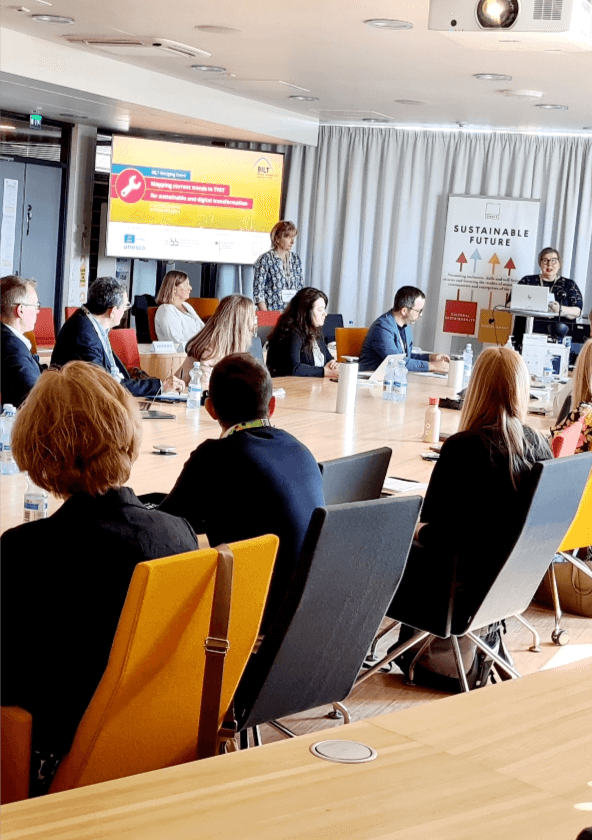About BILT: Our approach | Themes | Who we are
Get involved: News and events | BILT community | Expert group | Self-Reflection Tool
Knowledge base: Innovative and promising practices | Atlas of emerging trends | BILT library | TVETipedia

AdobeStock_479026353
The digitalization of diverse aspects of our daily lives is not something new, but a process that began decades ago with the introduction of mainframe computers in large companies. However, the scale and intensity with which this process has been taking place recently is unprecedented. The apex of these changes in TVET is materialized in Industry 4.0, prompted by the automation of industrial and administrative processes and the introduction of cyber-physical systems. This hybrid human-digital organization of work requires TVET, which lies at the intersection of work and education, to synthesize, process and provide timely solutions for challenges that arise.
TVET institutions must become familiar with how to curate available information and data to identify and understand the need for new qualifications and competencies. They must strengthen the culture of public-private partnership to enable a more fluid, constant and accurate flow of information between the world of education and the world of work.
Digitalization also permeates everyday life in TVET institutions across the globe, changing in a substantial way many aspects of the learning programmes. Scaling up the reach of TVET while promoting individualization of the teaching and learning processes is just the start of the current transformation of TVET, which contributes to building inclusive societies where all persons are equally supported to grow socially and economically.
Teachers, trainers, and students are on the frontline of the changes stemming from digitalization, and they are required to regularly update their competencies. Teachers are expected to be knowledgeable about new pedagogical approaches and classroom technology, and to design and use digital content. Students must familiarize themselves with relevant hardware and software, and develop digital competencies. In this setting, artificial intelligence, cloud computing robotics, 3D printing, the Internet of Things, and advanced wireless technologies stand out as topics where new competencies are required.
Five technologies in particular are driving innovation in TVET:
The digital divide and the uneven access to equipment, tools and skills are the first challenge of digitalization of TVET and skills systems.
ILO, 2021ICT skills training was reported being the type of professional development TVET teachers needed most.
OECD, TALIS 2018BILT begins with the premise that the shift to an inclusive digital economy is intricately linked to other significant issues, such as the megatrends of climate change, demographics, and migration. As a result, the BILT project examines how other developments such as sustainability influence and enhance digitalization. The Project places a specific emphasis on the dual transition of digitalization and greening.
This includes conferences on digitalization in TVET, where professionals gather to discuss the trends affecting the TVET sector and exchange information on innovation and learning techniques.

The BILT conference Mapping current trends in TVET for sustainable and digital transformation created forums for TVET stakeholders to debate innovative responses to digital challenges with the TVET community.
Read moreBILT works with TVET experts from Africa, Asia-Pacific, and Europe to explore the dual transition with a particular focus on the economic sectors of tourism and hospitality. This long-term approach to the theme allows the creation of new knowledge relevant for TVET practitioners. Acknowledging the importance of integrating pertinent practices into TVET, BILT Innovation and Learning Practices series highlights how digitalization is incorporated by TVET institutions in the three project regions.
BILT Learning Labs showcasing selected Innovation and Learning Practices offer an opportunity for TVET practitioners to share cutting-edge ideas and debate with the TVET community. The MilleaLab edition highlights how teachers are taught and certified using a cloud-based platform that offers users hundreds of templates and 3D models to construct virtual learning content without the need for coding expertise.

TESDA Online Programme takes advantage of information and communication technology's potential to improve TVET delivery, build future curricula with an eye on sustainability and social development, and establish new policies addressing inclusivity.
Read moreThe BILT project is implemented by
with support of
and sponsored by